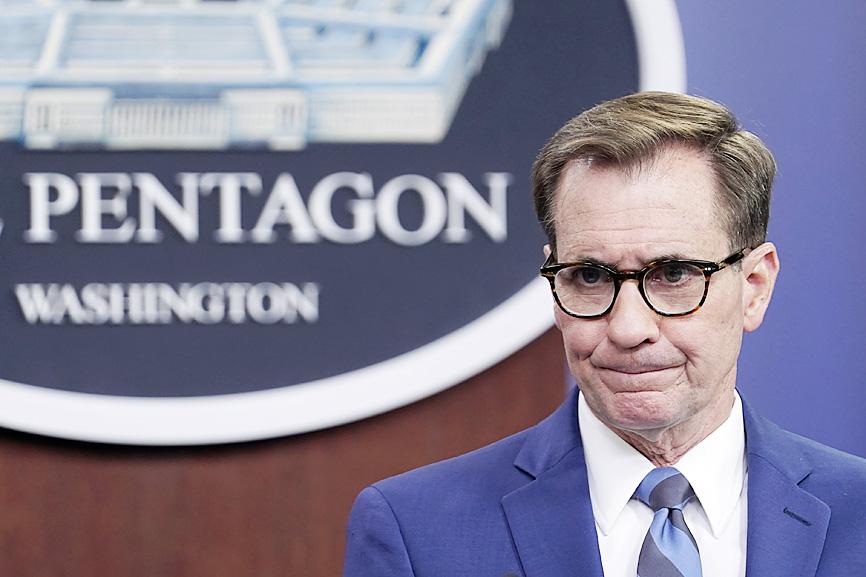The US government on Friday confirmed that it conducted military exercises with Japan, but declined to comment on the scenario of the drills, which a Financial Times report said involved combating China to defend Taiwan.
US Department of Defense spokesman John Kirby made the remarks at a news conference in response to a report on Thursday by the Financial Times.
Citing two unnamed US defense officials, the report said that the US and Japan have conducted secret war games around the Diaoyutai Islands (釣魚台), known as the Senkakus in Japan, which were billed as disaster relief drills, but were intended as joint military exercises to fight China in a dispute over Taiwan.

Photo: AP
Taiwan, the US and Japan have shared military aircraft identification codes since 2017, it added.
Japan had requested that the US share with it plans to defend Taiwan, but the US Department of Defense instead opted to enhance military cooperation with Tokyo in phases, it said.
“The eventual goal was for the allies to create an integrated war plan for Taiwan,” one official was quoted as saying.
Taiwanese experts said that news of the government sharing military aircraft identification codes with the US and Japan was a positive national security development.
Su Tzu-yun (蘇紫雲), an associate research fellow at the Institute of National Security and Defense Research, said that code-sharing is a necessary step before Taiwan, the US and Japan can conduct joint operations concerning the Taiwan Strait.
The codes are used by identification friend or foe (IFF) systems to identify aircraft, which increases engagement speed, he said.
“There were reports that Taiwan and the US are sharing the codes, so it makes sense that there is a trilateral arrangement,” he added.
The US is increasingly making public the advisers and activities of its security cooperation brigade in Taiwan, and broadening its exchanges in tactics, operations and strategy with the nation’s forces, he said.
Trilateral military cooperation must be allowed to develop at its own pace, and the process should not be rushed, he added.
The three countries had an understanding to share IFF codes, which is an important import breakthrough in relations, a source familiar with the matter said.
Sharing the codes means that Taiwan does not have to treat US military airplanes as unidentified aircraft in the Taipei Flight Information Region, which boosts flight safety and military efficiency, and conserves wear and tear on fighter jets, they said.
Erich Shih (施孝瑋), editor-in-chief of the Military and Aviation News Web site, said the arrangement would allow Taiwan to identify friendly US and Japanese aircraft.
If the US and Japanese aircraft were unknown, the military would have to intercept them with fighters or other air defense assets, he said.
The Air Force Command Headquarters said it had no knowledge of the article.
Additional reporting by CNA

Taiwan has received more than US$70 million in royalties as of the end of last year from developing the F-16V jet as countries worldwide purchase or upgrade to this popular model, government and military officials said on Saturday. Taiwan funded the development of the F-16V jet and ended up the sole investor as other countries withdrew from the program. Now the F-16V is increasingly popular and countries must pay Taiwan a percentage in royalties when they purchase new F-16V aircraft or upgrade older F-16 models. The next five years are expected to be the peak for these royalties, with Taiwan potentially earning

STAY IN YOUR LANE: As the US and Israel attack Iran, the ministry has warned China not to overstep by including Taiwanese citizens in its evacuation orders The Ministry of Foreign Affairs (MOFA) yesterday rebuked a statement by China’s embassy in Israel that it would evacuate Taiwanese holders of Chinese travel documents from Israel amid the latter’s escalating conflict with Iran. Tensions have risen across the Middle East in the wake of US and Israeli airstrikes on Iran beginning Saturday. China subsequently issued an evacuation notice for its citizens. In a news release, the Chinese embassy in Israel said holders of “Taiwan compatriot permits (台胞證)” issued to Taiwanese nationals by Chinese authorities for travel to China — could register for evacuation to Egypt. In Taipei, the ministry yesterday said Taiwan

Taiwan is awaiting official notification from the US regarding the status of the Agreement on Reciprocal Trade (ART) after the US Supreme Court ruled US President Donald Trump's global tariffs unconstitutional. Speaking to reporters before a legislative hearing today, Premier Cho Jung-tai (卓榮泰) said that Taiwan's negotiation team remains focused on ensuring that the bilateral trade deal remains intact despite the legal challenge to Trump's tariff policy. "The US has pledged to notify its trade partners once the subsequent administrative and legal processes are finalized, and that certainly includes Taiwan," Cho said when asked about opposition parties’ doubts that the ART was

If China chose to invade Taiwan tomorrow, it would only have to sever three undersea fiber-optic cable clusters to cause a data blackout, Jason Hsu (許毓仁), a senior fellow at the Hudson Institute and former Chinese Nationalist Party (KMT) legislator, told a US security panel yesterday. In a Taiwan contingency, cable disruption would be one of the earliest preinvasion actions and the signal that escalation had begun, he said, adding that Taiwan’s current cable repair capabilities are insufficient. The US-China Economic and Security Review Commission (USCC) yesterday held a hearing on US-China Competition Under the Sea, with Hsu speaking on